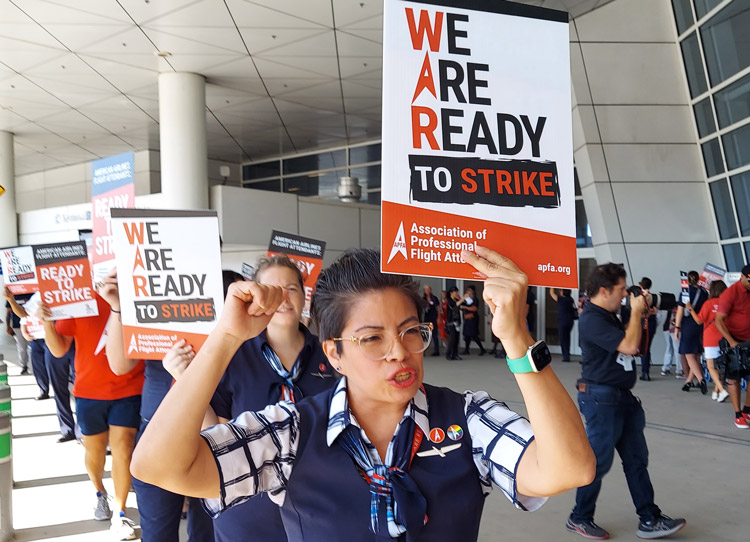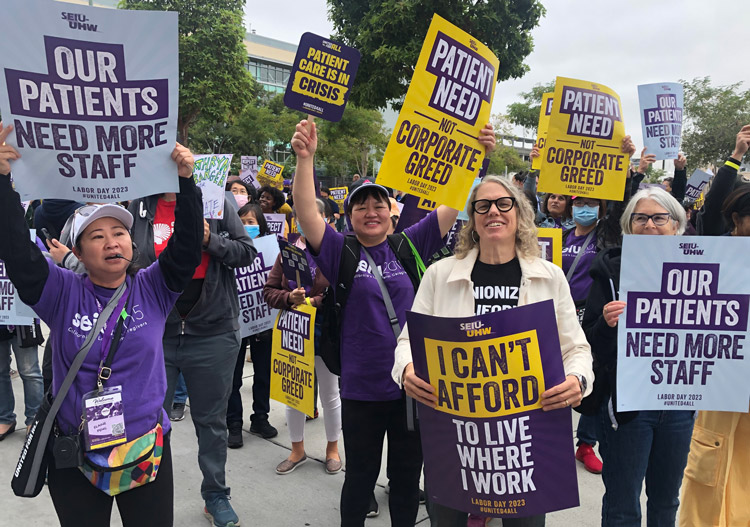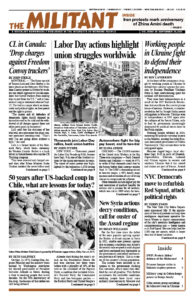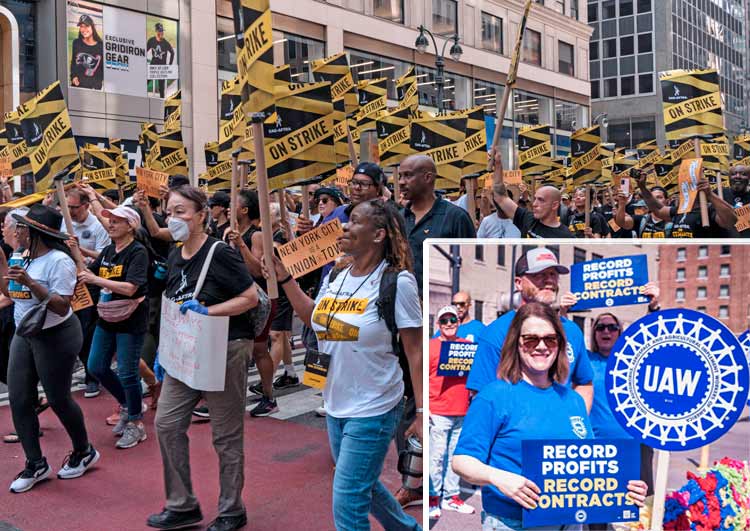NEW YORK — Thousands joined the Labor Day Parade up Fifth Avenue here Sept. 9 in one of the liveliest actions by the union movement in years. The mood of union power was highlighted by the boisterous 1,000-strong contingent of striking members of the Screen Actors Guild-American Federation of Television and Radio Artists and the Writers Guild of America. The two entertainment unions have been on the picket lines for months across the country.
Even though the industry and media promotes stars with a glamorous lifestyle, “we’re workers,” SAG-AFTRA member Christine Bruno, riding a motorized wheelchair, told the press. “We deserve a fair wage. We deserve protections.”
Many work two or more jobs to get by and conditions are getting harder. As streaming and “artificial intelligence” production expands, workers face new threats to their livelihood. “We absolutely do not deserve for our images and our likenesses to be used in perpetuity without fair compensation,” Bruno said.
Similar actions took place across the country as workers increasingly face moves by the bosses to put the deepening crisis of their capitalist system of production and trade on their backs. Battles over jobs, wages, safety and working conditions, unlivable schedules, and forced overtime are more common.
Below are a few of the reports the Militant received this week.
Wabtec strikers reach agreement, join Erie Labor Day Parade
ERIE, Pa. — Over 1,400 members of Locals 506 and 618 of the United Electrical workers union returned to work Sept. 5 at Wabtec’s plant here after 70 days on strike.
“This contract represents a substantial improvement over what Wabtec had on the table in June,” Local 506 President Scott Slawson told the media. “As a result of the action taken by our members, we made both economic and noneconomic gains.”
“I was proud of the stand the membership took to make the gains that were necessary,” Slawson told the Militant by phone. The strike was marked “by the solidarity among the members, and the solidarity received from unions across the U.S. and overseas.”
Workers won yearly wage increases of 3% and higher over a four-year contract, a $1,500 lump-sum payment, a cost-of-living clause to blunt inflation, and improvements in the grievance process to defend workers from company attack.
At the same time, the bosses succeeded in keeping a 10-year-long progression before new hires reach the same wages as long-time employees. The union did get the transition to equal out yearly over the 10 years. Before the strike, so-called legacy workers got $32.67 an hour while new hires started at $21.47.
The spirit of UE members coming out of the strike was on display at the Labor Day action, where boisterous UE marchers were the concluding contingent in the parade.
At the march, Steven Carpenter of Ironworkers Local 851 told the Militant that when the Erie Strayer plant was on strike here in 2021, the UE locals “came down every week to support us. So, we came every week to support their strike. We just need to stick together.”
— Tony Lane
American Airlines flight attendants: ‘We are ready!’
DFW AIRPORT, Texas — “We are ready!” “American Airlines, are you paying attention today? We will strike!” yelled hundreds of Association of Professional Flight Attendants members as they marched outside Terminal D of the Dallas-Fort Worth International Airport here Aug. 30.

“This is what corporate greed looks like today at American Airlines. Does anyone feel you are part of this team?” Julie Hedrick, president of APFA, told the crowd. “No!” everyone yelled. She replied, “No, they are part of the corporate greed team.” Hedrick announced that some 26,000 union members across the country had voted 99.4% to authorize a strike. Similar protests were held at airports in Charlotte, North Carolina; Washington, D.C.; New York; Orlando and Miami, Florida; Las Vegas; Philadelphia; and Chicago.
The APFA has been in negotiations with American Airlines for a new contract since 2018. Their demands include higher pay, automatic cost-of-living wage protection, compensation for time spent boarding passengers, and an improved retirement plan.
Members of the Service Employees International Union and the Communications Workers of America, who represent airport workers, joined the picket in solidarity. “I’m here to support my daughter who is a flight attendant,” Juan Cedillo told the Militant. “Her rent is over $3,000 a month and she pays groceries, gas, insurance. I was a union member for over 40 years in Local 226 where I was a bellman at a Las Vegas hotel. We need the unions today more than ever.”
“We have waited too long. It is time American comes to the table,” Hedrick told the Militant. “The contract expired in December 2019 and we haven’t had a pay raise in over four years. American is making record profits.”
— Alyson Kennedy
Striking New Jersey nurses rally for safe staffing, higher wages
MAPLEWOOD, N.J. — “What’s disgusting? Union busting!” chanted 180 striking nurses and supporters as they rallied and marched here Sept. 9. The nurses, members of United Steelworkers Local 4-200, struck Robert Wood Johnson University Hospital in New Brunswick to fight for safer staff-patient ratios.
“To deliver proper care, the number of nurses we have is not enough,” Anna Boada, an intensive care unit nurse, told the Militant. “Each ICU nurse is supposed to be responsible for two patients, but they push you to look after three. What if the patient has multiple medical devices you have to monitor?”
“No nurse wants to admit they can’t take care of their patients,” Ryan Siegel, an 18-year veteran at Robert Wood Johnson, told rally participants at the Maplewood Memorial Park rally. “Yes, nurses will do their best, but no one should be forced to try and make an impossible situation work. They’re trying to bust our union. The hospital wants nurses feeling hopeless, confused and divided. But we will not be broken.”
“We don’t want ‘recommendations’ on staff levels,” Siegel said. “We want enforceable and safe staffing, to increase the chance that our patients survive. Our demands are reasonable and attainable.” Other issues in the strike include higher wages, improved retirement benefits and a cap on health care costs.
Pediatrics nurse Jenny Torres was part of an earlier strike there in 2006. On Sept. 1, the hospital “has taken away our health insurance coverage,” she said, hoping to break strikers’ resolve.
Local 4-200 President Judy Danella welcomed a delegation of nurses from Clara Maas Medical Center in Belleville to the rally.
“It took over eight months but we’ve just unionized,” Tania Howard, an ICU nurse from Clara Maas, told the Militant adding they’re now members of 1199 SEIU United Healthcare Workers East. “We’re fighting for our first contract and we’re here to show our support.”
— Terry Evans
Calif. health care workers rally for safe staffing, higher pay
OAKLAND, Calif. — Unions representing 85,000 health care workers in seven states and the District of Columbia are in a contract fight with giant HMO Kaiser Permanente. They are demanding Kaiser hire more workers.

More than 1,000 people joined a protest outside the Kaiser hospital here on Labor Day Sept. 4. Nam Nguyen, a health and wellness counselor at Kaiser, told the Militant that workers leaving and not being replaced has left staff vacancies up to 33%. Respiratory therapist Erica Chinchilla described the excruciating decisions she has had to make in deciding what patients struggling to breathe to prioritize when she can’t possibly treat them all.
The contract negotiated in 2019 by a national coalition of Kaiser Permanente unions expires Sept. 30. The coalition, which includes more than a dozen local unions, has announced that over the next few weeks union members will be voting on whether to authorize a strike.
Union demands for higher wages are linked to the staffing issue. “There is turnover because you can’t make it on the wages, especially single mothers,” Nguyen said. “That’s why the union is demanding that no worker make less than a minimum of $25 an hour.”
Bargaining committee member Kay Grover, a licensed vocational nurse at Kaiser in Sacramento, said the bosses are demanding the union give up the right to strike in solidarity with Kaiser workers in other unions when they go on strike. “It’s divide and rule,” she said. “We have to stand up to this.”
— Betsey Stone
Ohio school bus drivers strike against boss surveillance
LIBERTY TOWNSHIP, Ohio — School bus drivers, members of Teamsters Local 100, won a victory in a one-week strike here that ended Sept. 8. Some 300 school bus drivers and aides for the Lakota Local School District north of Cincinnati walked out Sept. 1 against Petermann Transportation, the company the district contracts with. Lakota has 17,400 students in 23 schools.
“They call us part time, but it’s a long day working split shifts of 6 a.m. to 9:30, 11:30 a.m. to 1:30, and 1:45 to 5,” Kim Marguerat, a driver for 21 years, told the Militant while picketing on the first day of the strike outside the district office here. “And we only get paid for eight hours. We’re standing up to big corporations that just want to put their thumb on us.” The union’s lively picket lines drew more than 100 each day of the strike.
A major issue was the company’s demand to use surveillance cameras to spy on drivers, which can lead to discipline and penalties up to termination. “We’re not trying to hide anything,” Jodie Gabbard, a driver and union steward, told the Militant, “but we’re not robots, we’re human.” She explained that with the company’s original contract proposal drivers could have been fired for taking one hand off the steering wheel for just a second, or even taking a drink of water.
Teamsters Local 100 President Bill Davis told the media that the contract, voted up by 86% of the membership, allows the company to use bus video for discipline only in cases of serious issues like fighting or alcohol and drug use.
— Betsy Farley
Metro grocery workers assess gain in Toronto strike
TORONTO — The strike by 3,700 members of Unifor Local 414 at 27 Metro grocery stores here ended when a majority of the workers voted to accept a new contract Aug. 31. They went on strike July 29 after rejecting a proposed agreement between the bosses and the union negotiating committee. The workers wanted to regain the $2 an hour raise they had won during the COVID-19 pandemic that bosses have since taken away, and to win further raises to deal with rising inflation.
In the five-year contract both full-time and long-term part-time workers will get a 4.50 Canadian dollar raise per hour ($3.30), including CA$1.50 immediately and CA50 cents more in January. Part timers will get CA$3.20 per hour overall, CA$1.50 immediately. The key difference from the offer workers rejected is that full-time and long-term part-time workers won a CA$2 increase by January.
Before the new agreement average wages for full-time employees was CA$22.60 an hour and for part time CA$16.62. Part timers are over 70% of the workforce.
“The strike was overall a good experience. We let the company know we’re not easily pushed around,” said Sheldon Scantlebury, a 10-year-long Metro worker. “I do feel that people in the store who didn’t usually converse got a lot closer.”
Union members had mixed feelings about the result. “We could have gotten better,” Cadillera, who had been a union leader in a garment factory in the Philippines before coming to Canada, said. “I didn’t like a five-year contract.”
Cathy Wood, a part timer in the meat department at the Lloyd-Manor store, said, “For some the wages in the contract are OK, but not for a family with two kids.” Mary Leonard said, “We got more than in the previous contract offer. Sick days for part timers is new.”
The strikers won wide solidarity. To show support, some 50 Jewish members from the Darchei Noam Congregation joined the pickets line Aug. 15 at the Lawrence and Bathurst Street store, which sells a lot of kosher food.
— Joe Young
U.K. rail workers rally against employer attacks
LONDON — Hundreds of rail union members and their supporters marched and rallied here Aug. 30, protesting the rail bosses’ closure of 1,000 ticket offices across the country, eliminating over 2,000 jobs. The rally was called by the Rail, Maritime and Transport Workers union, and General Secretary Mick Lynch was the main speaker. Joining Lynch was Mick Whelan, general secretary of the Associated Society of Locomotive Engineers and Firemen.
Over the next two days, both the RMT and the locomotive engineers’ union struck nationwide — each for 24 hours — in a long-running fight for better pay and conditions.
“This is about much more than selling tickets,” Martin McNulty, a train conductor and RMT union representative for the Liverpool branch, said. “It’s about the jobs of workers in hundreds of ticket offices and the help and human contact given — not only to disabled persons, but to provide safety for women and others alone late at night on empty platforms. The bosses are all about the money. If you don’t fight, you always lose.”
McNulty came as part of a contingent of 50 other union members from Merseyside in England’s northwest. Over 100 Rail, Maritime and Transport Workers members from the region joined the march, including rail workers from Wigan and Manchester.
Among them was Anne Howie, a member of the Manchester South RMT branch, along with branch Chair Conor Price. Howie was dismissed from her job as a train dispatcher at Manchester Piccadilly station on charges of making a safety violation. Employed by Carlisle Support Services, a contract company, she dispatches trains for TransPennine Express, one of the train-operating companies involved in the fight over pay, conditions and ticket office closures. The union is fighting to have her dismissal reversed.
“An injury to one is an injury to all,” says a flyer issued by her union branch. The union’s petition demanding her immediate reinstatement has been signed by over 1,000 union members, from Manchester and around the country.
The union won a similar fight last year, when fellow Carlisle dispatcher Pete Clifford won reinstatement.
— Jonathan Silberman
Spirited Toronto Labour Day largest one in Canada
TORONTO — Over 20,000 participants marched in the Toronto and York Region Labour Day Parade here Sept. 4, led by a contingent of Canadian Media Guild workers on strike at the TVO television network. They’re fighting for better wages and against boss demands for divisive two-tier benefits.
Metro grocery store workers, who recently won a new contract with gains in wages and benefits in the greater Toronto area, marched in the Unifor union contingent.
This 151st annual Toronto march was this year’s largest union-organized Labour Day action across Canada. It filled the streets with actors and film industry technicians, school workers, teachers, public sector workers, and sizable contingents of construction and skilled-trades workers. It was colorful, loud and reflected the spirit that workers here have shown in resisting the sharp rise in the cost of living and ever-worsening working conditions.
Actors and writers across Canada who work on U.S. company productions — the majority here — are largely shut down by the Screen Actors Guild and Writers Guild strikes there. Still, leaders of the corresponding Canadian unions told the Canadian Broadcasting Company they support their fellow unions on strike and face the same issues. Their contracts come up over the next year.
— Lynda Little


